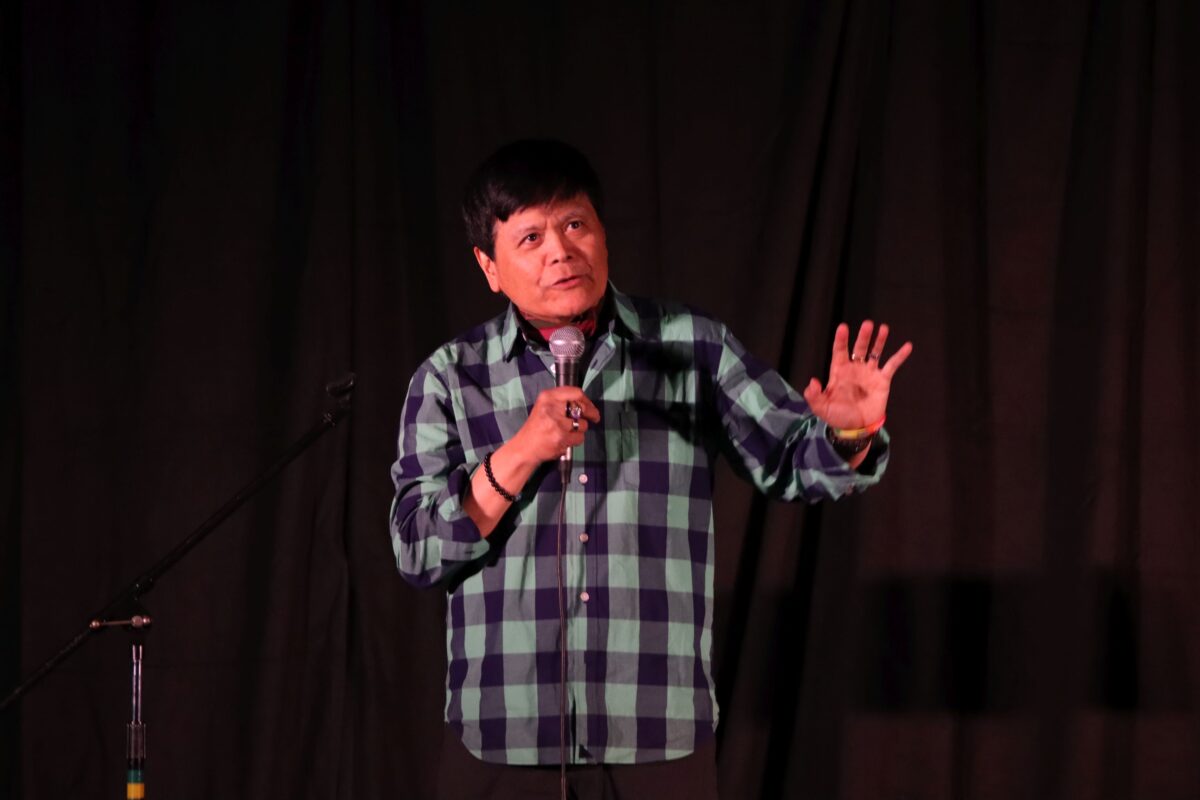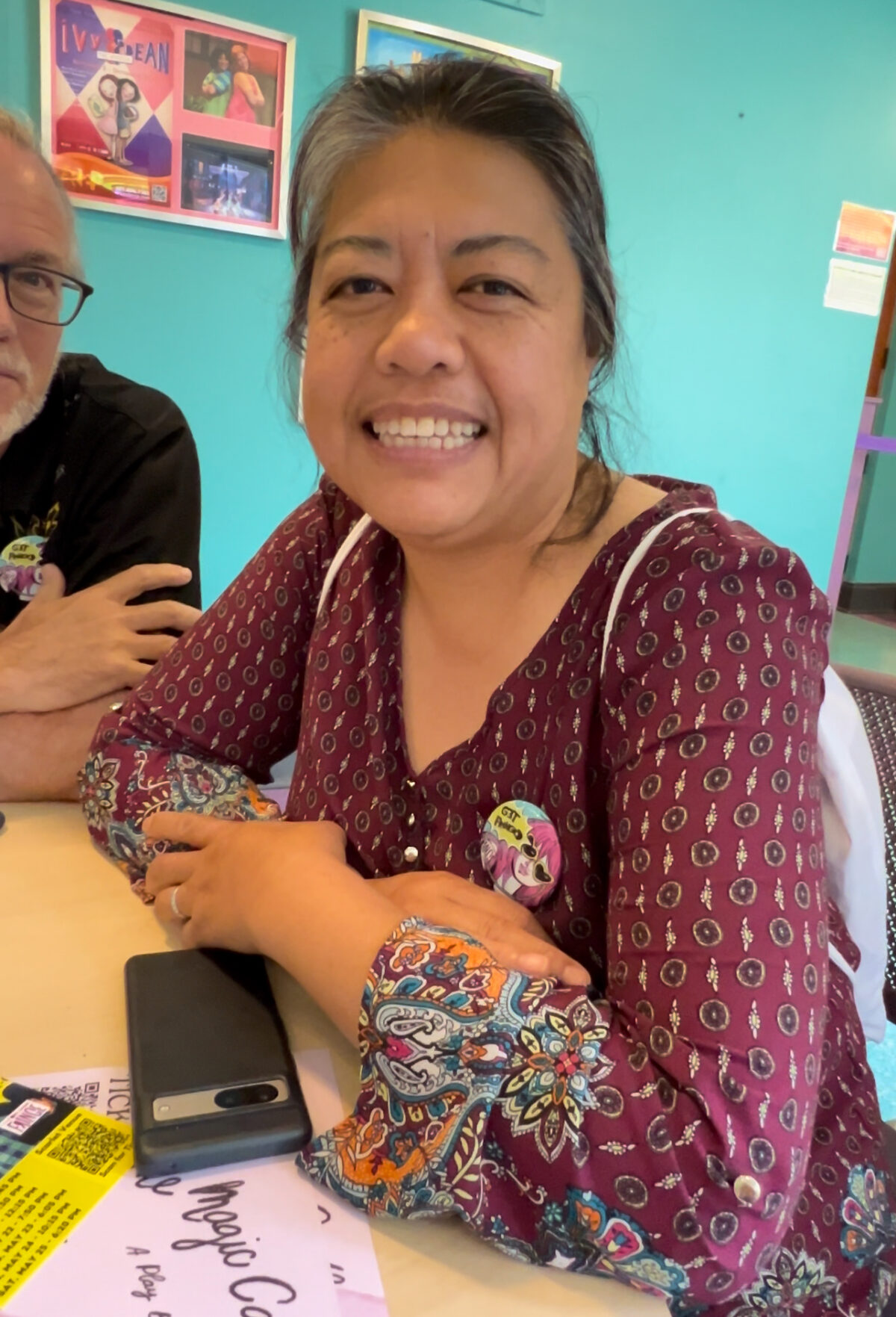On Pakipinos and the next 50 years of civil rights

Award-winning journalist and Inquirer.net USA columnist Emil Guillermo tells his stories in a comic one-man show, “Emil Amok, Lost NPR Host, Wiley Filipino, Vegan Transdad.” CONTRIBUTED
If you are satisfied where we are with civil rights in America, then I’m sure you’ll enjoy the next 50 years.
That’s when we’re likely to find ourselves fighting to keep what we have.
Or lose it all.
That’s what’s at stake.
So this week, I couldn’t make the 50th anniversary gala of AALDEF, the Asian American Legal Defense and Education Fund in New York.
Unfortunately, I was in Florida already fighting for the next 50 years.
I’m doing my show, “Emil Amok, Lost NPR Host, Wiley Filipino, Vegan Transdad,” an iteration of the show I did while in New York a few months ago.
Here’s what I found in FLA. Asian Americans, especially Filipinos, had no clue about the history of racism toward Asians and Filipinos that is a theme in my play. I talk about the colonized Filipinos brought to the US to replace the Chinese victimized by the Chinese Exclusion laws.
One of them was my father.
As a colonized “American National” my father couldn’t vote, own land or intermarry. Was he free? Just free to work and take the abuse of xenophobic white males. Filipinos would take their jobs and endure white male rage.
And then they would date, consort and marry white women. That got Filipinos killed, lynched and shot.
It’s part of American history few know about. And of course, in a state like Florida, where they have low-information voters, you also have the blowback on so-called “critical race theory,” creating a population with a low-history mindset.
The Filipinos at the Orlando Fringe
“I’m embarrassed to say I didn’t know a lot of our history,” said Emily Janninck, a Filipino American recently retired from the medical field. She came to my show and was both entertained and informed.
Janninck was born in the Philippines and was left with her grandmother as an infant as her parents became the first to leave for the US after the historic 1965 Immigration Act lifted the racist quotas that kept a large Asian American community from forming.
Her parents were in Brooklyn and were divorced when Janninck was reunited just with her mom. As a unique 1.5 Filipino generation, she moved with her single mom to Chicago where she grew up and met her husband Jim. For the last 20 years they’ve been in Orlando.

Emily Janninck / CONTRIBUTED
Clearly, waiting for the arrival of “Emil Amok.”
Another, Asian American in the Fringe audience was Jennifer Chandy, a Filipino Pakistani.
Chandy was curious about my show and said she’ll see it this week (go to https://a.tixlink.co/amok).
Chandy’s mom, like many of my Filipino relatives in the Philippines, were forced to go to Saudi Arabia to find work. That’s where her mom met her dad, who came from Pakistan to also find work. Together, they started a family that eventually found its way to the US.
And now Chandy is a “Pakipino.”
“There’s not too many of us,” she said. “But we have great food!”
These are the Asian Americans who come to my show. They get the history, but few others understand that the rights of Asian Americans are still threatened like they were 100 years ago.
The civil rights fight the next 50 years: Fighting the unraveling
The 1924 Immigration Act was the most racist immigration act and was in play until the 1965 law ended the zero quota for Asians.
At the same time, aliens couldn’t vote, couldn’t intermarry, couldn’t become citizens. And, they couldn’t own property.
That last part, property, is still being fought today.
In Florida, SB264 would ban many Chinese immigrants from buying home throughout the state. It’s a xenophobic reaction to Chinese people who are seen as possible threats to national security.
The fight from 100 years ago is back.
“Florida’s alien land law specifically targets Chinese individuals in a clear violation of the Equal Protection Clause,” said Bethany Li, legal director of AALDEF. She hoped that the recent halting of the law would keep copy-cat laws from coming up in other states to ban property sales to more than just Chinese. “As a country we should be making progress and passing laws that protect all communities rather than going back in time and reviving antiquated laws.”
Bethany is soon to be the executive director, taking over for Margaret Fung, a co-founder of AALDEF who helped build it to its legendary status as the Asian American civil rights fighter. Fung retires later this year.
What I’m seeing in Florida is an example of the kind of fights Asian Americans will be forced to wage in the coming years.
We climbed the mountain once. We will be forced to climb the same mountains again.
It’s the lesson for the modern Asian American activist.
As we’ve seen in issues like abortion rights and voting rights, the rights game requires perpetual vigilance. Nothing seems settled anymore in America. There is always someone willing to take away our rights at a moment’s notice.
So while I regretted not being able to see the sunset on the Hudson to celebrate the first 50 years of Asian American civil rights, I was happy to be in Florida where I can see what the battle looks like the next 50 years.
We’ll be fighting the undoing of major victories. And of course, fighting for gains in areas where no one thought we had any rights at all.
But the last 50 years got us to this point. And for that we all must be grateful.
Emil Guillermo writes a column for the Inquirer.net US channel. A former host of NPR’s “All Things Considered,’ he is an award-winning journalist who now tells his stories in a comic one-man show. “Emil Amok, Lost NPR Host, Wiley Filipino, Vegan Transdad,” is currently at the Orlando Fringe from May 22 to May 25 . For times and tix: https://a.tixlink.co/amok

